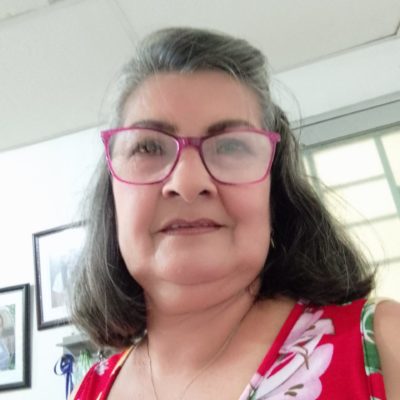26 September 2022 · Global Partnership for Zero Leprosy
Q&A: Meet Lucrecia Vásquez Acevedo, GPZL Leadership Team Member
GPZL Leadership Team member, Lucrecia Vásquez Acevedo, shares her personal experience of leprosy and how she is working to end leprosy and meet community needs.

What is your personal experience of leprosy?
At the time that my son became a father, my son and I were diagnosed with leprosy. We both feared we would die. We felt shame and fear and had so many questions about the disease but didn’t know how to talk about it or with whom. I started learning as much about leprosy as possible, which helped encourage my son to not give up. We underwent treatment for 12 months, and the health professionals supported me. My desire to live grew greater each day, and my son and I were motivated by humility and respect for people who experience leprosy. At the time, I didn’t know that I would one day work nonstop to support this community.
Although my son and I felt alone in our diagnosis, we eventually met other people who had experienced the same disease. I saw that recovery was possible. I began to walk a beautiful path that today has given me the opportunity to represent thousands of people around the world. Today I carry a light of hope without fear or stigma. I know I must continue forward for people who are waiting for a helping hand. Today I can say that leprosy should be a thing of the past. I continue fighting to see that it is eliminated.
How was Felehansen formed? What does the organization do?
Many people do not know that leprosy is curable, treatment is free, rehabilitation is possible, and that, according to the United Nations, persons affected are entitled to their full human rights. Felehansen was formed by a group of people who saw the need for greater visibility, inclusion, and respect from a society that knows little to nothing about leprosy, also known as Hansen’s disease.
In 2012 the National Committee of people affected by leprosy was created in Colombia. Still, we realized that we needed a national federation in order to represent all people affected in Colombia. Thus, in 2014, Felehansen was born. Felehansen has been supported by the German Leprosy Relief Association (GLRA or DAHW). Felehansen is organized, trained, and led by persons affected themselves. We work to forge a better future for us all, with humility, respect, and love. For the past four years, I have been responsible for legally representing the federation, which continues to grow and carry Felehansen flags all over the world. We lead radical change in the lives of persons affected, their families, and the community.
Like many organizations of persons affected by leprosy, Felehansen addressed the immediate needs of the leprosy community during the COVID-19 pandemic. How has Felehansen worked to support the leprosy community in Colombia since 2020?
Felehansen had been growing rapidly when the COVID-19 pandemic began. It was hard to see our activities postponed due to fear of contracting the virus. Other fear emerged, including fear of losing our colleagues, hunger, and lack of basic necessities. Mental health challenges also arose, and people were unable to go to health centers. It was a time of total chaos.
The leaders of Felehansen were knowledgeable about the needs of persons affected across different regions of Colombia. They worked with partner organizations such as GLRA and Sasakawa Health Foundation to provide more than 1000 people with much-needed aid, including food and biosecurity products. We were able to bring hope to people during a difficult time.
To continue strengthening the work of Felehansen during the pandemic, we held trainings on communication tools, connected with community members by video call, and worked with professionals to help assess patients’ needs.
Felehansen aims to strengthen people’s organizations through inclusion and social participation. From your perspective, what do inclusion and participation look like?
In accordance with WHO regulations, we are working with the national and municipal health systems to ensure that civil society has a significant space to participate. We participate in political advocacy and must be included at the decision-making table where inclusive activities are developed. We continue to strengthen our role in these spaces alongside national and international organizations.
What do you hope to see GPZL accomplish in the short and long term?
By joining the GPZL Leadership Team, I aim to address challenges with the same courage that drove me to face my leprosy diagnosis when I thought I was alone. I hope that we generate joint-support strategies alongside partners that value the voices and experiences of persons affected. Each of our messages should be heard and analyzed. We are experts in the experience of the disease, and we want to share our resilience and strength. We should continue to work with organizations and individuals who share our mission to end stigma and discrimination and are committed to hope, humility, and love.
I hope that together we can end leprosy and allow persons affected to be leaders of their own development and that of their communities. Through inclusion, we can strengthen our abilities to move forward and continue growing.